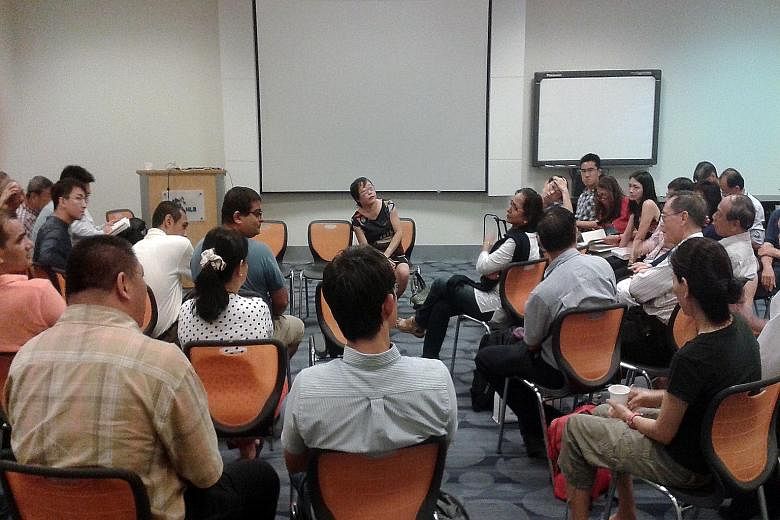When Singapore housewife Hamsa Balakrishnan quit her banking job in 2013 to care for her ailing widowed father in Bangalore, she could not have imagined that it would lead her to love non-fiction book clubs.
India-born Mrs Balakrishnan, 55, who is a married mother of three, recalls: "It was just him and me sitting at home, so my cousin got me to join her book club. Once a month, I would go to this club of mostly housewives and read some books." She especially likes non-fiction books because they help her think through real-life issues.
Her father, Mr C.V. Gopala Krishnan, was for many years the deputy editor of Indian newspaper The Hindu. She recalls that he was "a great fan" of The Straits Times, which he would read whenever he visited her in Singapore. He even wrote letters to its Forum page.
He died at the age of 85 in 2013 and Mrs Balakrishnan returned here, not knowing that another non-fiction book club, The Big Read Meet, was taking root here.
She signed up for alerts about the National Library Board's reading programmes and learnt of the Meet, which I host every last Wednesday of the month at the board's headquarters in Victoria Street.
She attended her first session on Wednesday, which was a discussion of Misbehaving by the father of behavioural economics, Richard Thaler. Professor Thaler is better known for the 2008 book Nudge, with co-author and fellow academic Cass Sunstein. For so long, Professor Thaler notes in Misbehaving, economists have thought of people as beings who behave as logically and dispassionately as Dr Spock of Star Trek. But people often decide or choose, according to their feelings. To most economists, that is "misbehaving".
Of the Meet, Mrs Balakrishnan said: "I found it insightful because so many things were discussed from different points of view. We had an economist, a mathematician and many other people sharing their perspectives knowledgeably."
The economist she was referring to was Mr Bart Remes, 50, a Belgian who is married to a Singaporean and who has lived here for 15 years. He did much to foster a fun, lively discussion by articulating clearly many economic principles.
This was when readers pondered whether they should dive into or decline a bowl of nuts that their host served them before dinner. Conventional economics suggests that having more of something was a boon, but most readers at the Meet could think of at least six different reasons why the nuts might actually be a bane.
The mathematician in their midst was Mr Indranil Mukherjee, who referred to another of Professor Thaler's examples of why economics should factor in how humans really behave in a given situation.
Mr Mukherjee, 46, managing director of standards certification company ISC Global, noted how former New York mayor Michael Bloomberg ordered soft drink makers to sell their pop in smaller cans, to combat rising obesity in the city. But the smaller drink cans only led people to buy more of such cans, defeating their purpose.
Wednesday's session was also Mr Mukherjee's first.
He said later that unlike the book clubs he had attended in Europe, "where two voices would typically dominate discussions", he liked how the Meet "involved everyone".
At one point, Mr Remes mused: "Money on its own has no use ... it is a language like French and German. Money is actually an information system."
This led many readers to wonder why Singaporeans queue for and fight over things, including Hello Kitty dolls sold by fast food chain McDonald's. Reader Elizabeth Chau noted how most people think of things in terms of relative value, by comparing the price of one item with that of another. She added that the perceived value of a coveted item after making such comparisons is what led to, say, stock prices see- sawing, often for no good reason.
I shared that some brain experts who advise the World Economic Forum, including neuroscientist Gemma Calvert of the Nanyang Technological University, considered Singapore the capital of nudging because of the many subtle signs in the city to encourage better behaviour in public.
Mr Mukherjee had everyone in stitches when he quipped: "I guess that makes all of us little nudge-ettes of wisdom."

